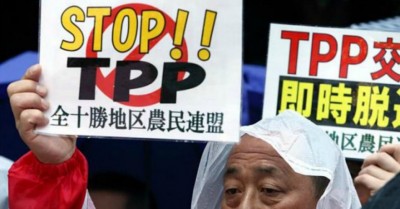Despite Outcry of Opposition, Obama Pushes “Horrific” Trans-Pacific Partnership (TPP) Trade Deal in Asia

Though president once railed against so-called “free trade” agreements, he has now become outspoken champion of secretive deals that critics call attack on democracy, workers, and the planet.
Despite consistent and vocal opposition from organized labor, environmentalists, progressive economy experts and others warning against the damaging impacts of a trans-Pacific trade agreement that remains under negotiations by the U.S. and twelve other nations, President Obama on Monday once again voiced his support for what he said would be a “historic” agreement.

Japanese farmers and their supporters hold placards and chant slogans against an anti-Trans Pacific Partnership (TPP) trade deal at a rally in front of the prime minister’s official residence in Tokyo on April 22, 2014, the day before US President Barack Obama visits. Japan seeks to retain tariffs on five farm product categories, rice, wheat, beef and pork, sugar, and dairy products, amid strong concern from the domestic agricultural industry. (Photo: AFP)
In Beijing for talks with his Chinese counterpart and to attend the Asia-Pacific Economic Cooperation (APEC) forum, Obama championed the so-called “free trade” deal, known as the Trans-Pacific Partnership (TPP), even though critics have described the agreement as a “horrific” corporate giveaway that would further codify the undemocratic mechanisms of global trade, breaking down protections for workers, consumers, and the planet’s natural systems.
Though Obama ran for president in 2008 as a staunch opponent of similarly designed trade deals, including NAFTA, since taking in office, he has forcefully pushed for the TPP and a similar deal with European nations, called the Transatlantic Trade and Investment Partnership (TTIP).
“This has the potential for being an historic agreement,” Obama said of the TPP to heads-of-state and trade commissioners at the APEC summit’s opening session on Monday.
If approved, the TPP would be the world’s largest economic trade agreement, encompassing more than 40 percent of the world’s GDP. Though China would not be party to the agreement, the TPP would cover the U.S., Canada and Mexico in North America; Chile and Peru in South America; and Japan, Australia, Brunei Darussalam, Malaysia, New Zealand, Singapore, and Vietnam in the Pacific-Asia region.
Though U.S. officials said no breathroughs or announcements were expected on the deal during this trip, the president used the occasion to champion the aims of the TPP.
“What we are seeing,” Obama told those in attendance, “is momentum building around a Trans-Pacific Partnership that can spur greater economic growth, spur greater jobs growth, set high standards for trade and investment throughout the Asia-Pacific.”
Following last weeks mid-term elections in the U.S., some analysts argued that a Republican-controlled Congress—which is generally friendlier to the corporate trade framework of such deals—is more likely to help Obama push through the agreement. However, as Lori Wallach, director of the Public Citizen’s Global Trade Watch, pointed out, that calculation may be misplaced.
According to Public Citizen, the TPP would be a grab-bag of policies designed to empower corporate entities while stripping the people of these twelve nations of self-determination and democratic process. According to the group:
Although it is called a “free trade” agreement, the TPP is not mainly about trade. Of TPP’s 29 draft chapters, only five deal with traditional trade issues. One chapter would provide incentives to offshore jobs to low-wage countries. Many would impose limits on government policies that we rely on in our daily lives for safe food, a clean environment, and more. Our domestic federal, state and local policies would be required to comply with TPP rules.
The TPP would even elevate individual foreign firms to equal status with sovereign nations, empowering them to privately enforce new rights and privileges, provided by the pact, by dragging governments to foreign tribunals to challenge public interest policies that they claim frustrate their expectations.

